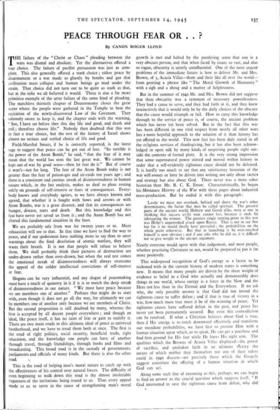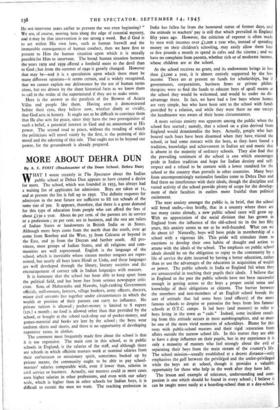PEACE THROUGH FEAR OR . .
By CANON ROGER LLOYD
THE failure of the "Christ or Chaos" pleading between the wars was dismal and absolute. Yet the alternatives offered a true choice. The failure of pacifist persuasion was just as com- plete. This also generally offered a stark choice ; either peace by disarmament or a war made so ghastly by bombs and gas that civilisation must collapse and human beings go mad under the strain. That choice did not turn out to be quite so stark as that, but at the tithe we all believed it would. There is also a far more primitive example of the utter failure of the same kind of pleading. The matchless thirtieth chapter of Deuteronomy closes the great scene where the people were gathered in the Temple to hear the recitation of the newly-discovered Law of the Covenant. They solemnly swore to keep it, and the chapter ends with the warning, "See, I have set before thee this day life and good, and death and evil ; therefore choose life." Nobody then doubted that this was in fact a true choice, but the rest of the history of Israel shows almost no serious and settled choice of life and good.
Field-Marslial Smuts, if he is correctly reported, is the latest sage to suggest that peace can be got out of fear. "So terrible is the power of the Atom Bomb," he said, "that the fear of it may mean that the world has seen the last great war. We cannot be kept out of war by good sense—then let fear do it." But of course it won't—not for long. The fear of the Atom Bomb today is not greater than the fear of poison-gas and air-raids ten years ago ; and there is a consistent and curious streak of disinterestedness in human nature which, in the last analysis, makes us deaf to pleas resting solely on grounds of self-interest or fears of consequences. Every- body knows and everybody agrees, as we have always known and agreed, that whether it is fought with bows and arrows or with Atom Bombs, war is a great disaster, and that its consequences are hunger, disease, tears and death. But this knowledge and this fear have never yet saved us from it ; and the Atom Bomb has not altered this fundamental situation in the least.
We are probably safe from war for twenty years or so. Mere exhaustion will see to that. In that time we have to find the way to peace, and if our spokesmen have nothing more to say than to utter warnings about the final desolation of atomic warfare, they will waste their breath. It is not that people will refuse to believe them. We shall probably think their pictures of destruction are under-drawn rather than over-drawn, but when the real test comes the emotional streak of disinterestedness will always overcome the appeal of the colder intellectual convictions of self-interest or fear.
Slogans can be very influential, and any slogan of peacemaking must have a touch of quixotry in it if it is to match the deep streak of disinterestedness in our nature. "We must have peace because we are members one of another." Perhaps that might do to start with, even though it does not go all the way, for ultimately we can be members one of another only because we are members of Christ. But the second proposition is still doubted by many, whereas the first is accepted by all decent people everywhere ; and though an ideal, like peace itself, it has no taint of fear or gain to stultify it. There are two main roads to this ultimate ideal of peace as universal brotherhood, and we have to tread them both at once. The first is the road of right politics, social security, beneficial trade, right education, and the knowledge one people can have of another through travel, through friendships, through books and films and broadcasting. This broad road is in the custody of governments, Parliaments and officials of many kinds. But there is also the other road.
This is the road of helping man's moral nature to catch up with the effectiveness of his control over natural forces. The difficulty of even beginning to walk down this road is the almost intolerable vagueness of the invitations being issued to us. Thus every appeal made to us to serve in the cause of strengthening man's moral growth is met and halted by the paralysing sense that one is a
very obscure person, and that when faced by issues so vast, and also so vague, obscurity is utterly uninfluential. One of the most urgent problems of the immediate future is how to deliver Mr. and Mrs. Brown, of 5, Acacia Villas—them and their like all over the world— from greeting a phrase like "The Moral Growth of Humanity"
with a sigh and a shrug and a mutter of helplessness.
But in the summer of 1940 Mr. and Mrs. Brown did not suppose that their obscurity was a synonym of necessary powerlessness. They had a cause to serve, and they had faith in it, and they knew instinctively that it would only be by the daily choices of the obscure that the cause would triumph or fail. How to carry this knowledge through to the service of peace is, of course, the ancient problem which has never yet been solved. But in the fact that this war has been different in one vital respect from nearly all other wars lies a more hopeful approach to the solution of it than history has yet offered to the world. This new fact has been duly stated in all the religious services of thanksgiving, but it has also been acknow- ledged in open talk by many kinds of surprising people right out- side the contexts of formal piety. It is the very strong impression that some supernatural power stirred and moved within history in order that a self-evidently righteous cause should not be defeated. It is hardly too much to say that any satisfactory historian of the war will sooner or later be driven into writing not only about tactics and strategy but also about God. There never was a more sober historian than Mr. R. C. K. Ensor. Characteristically, he began his Miniature History of the War with three pages about industrial mass-production. But he ended it with this paragraph :
Lastly we must not overlook, behind and above the war's othet determinants, the factor that may be called spiritual. The greatest poets of the ancient world, Hebrew and Greek alike, were at one in thinking that success evilly won cannot last, because it ends by infatuating the winner. The greatest single turning-point in this war was Hitler's unprovoked attack upon Russia. That is not to say that but for it he would finally have prevailed ; the probabilities on the whole point otherwise. But that in launching it he ,over-reached himself is now obvious ; and if one asks why he did so, it is difficult not to give weight to the ancient argument.
Nearly everyone would agree with that judgement, and most people, whether practising Christians or not, would be prepared to. put it far
more positively.
This widespread recognition of God's energy as a factor to be reckoned with in the current history of modern states is something new. It means that many people are driven by the sheer weight of evidence to belief in a God who actually and demonstrably does things in our world, whose energy is a force in the Now and the Here not less than in the Eternal and the Everywhere. If we ask why, the only possible answer is that God did not intend the righteous cause to suffer defeat ; and if that is true of victory in a war, how much more true must it be of the winning of peace. Yet righteous causes have suffered defeat in the past, and peace has never yet been permanently secured. But even this contradiction can be resolved. If what a Christian believes about God is true, then if His energy is to reach downward effectively and transform our mundane probabilities, we have first to present Him with a human situation upon which, so to speak, He can get a purchase and find firm ground for His feet while He bares His right arm. The qualities which the Browns of Acacia Villas displayed—the power of sacrifice, and unshaken faith in an ultimate Victory the means of which neither they themselves nor any of their rulers could in 1940 discern—are precisely those which the Gospels suggest constitute the offering of a human situation in which God can act.
Along some such line of reasoning as this, perhaps, we can begin to find an answer to the crucial question which suggests itself, " If God intervened to save the righteous cause from defeat, why did • He not intervene years earlier to prevent the war even beginning? " We are, of course, moving here along the edge of essential mystery, and it may be that intervention is too strong a word. But if God is to act within His own laws, such as human freewill and the immutable consequences of human conduct, then we have first to present to Him the human situation upon which it is morally possible for Him to intervene. The broad human situation between the years 1929 and 1939 offered a foothold more to the devil than to God ; but from the summer of 1940 it greatly changed. However that may be—and it is a speculation upon which there must be many different opinions—it seems certain, and is widely recognised, that we cannot explain our deliverance by the use of human terms alone, but are driven by the sheer historical facts as we know them to call in the realm of the supernatural if they are to make sense.
Here is the answer to the paralysis of the Browns of Acacia Villas and people like them. Having seen it demonstrated before their eyes, they believe now, whether dimly or vividly, that God acts in history. It ought not to be difficult to convince them that He also acts for peace, since they have the two prerequisites of such a belief, a potential interest in God and an, amazement at His power. The second road to peace, without the treading of which the politicians will travel vainly by the first, is the pointing of this moral and the adorning of this tale. That ought not to be beyond our power, for the groundwork is already prepared.



























 Previous page
Previous page